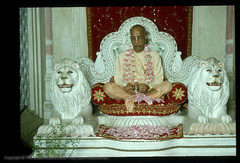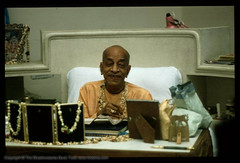“Kṛṣṇa, who is known as Govinda, is the supreme controller. He has an eternal, blissful, spiritual body. He is the origin of all. He has no other origin, for He is the prime cause of all causes.”
(Srimad Bhagavatam——6:1:41——purport).
Lord Sri Krishna Is The Supreme Controller
21 Sep 2012 Leave a comment
in Achintya-Bheda-Abheda Tattva, Bhagavad-Gītā As It Is, Gaudiya Vaisnava Acaryas - Guru Vakya, Gopala Tapaniya Upanishad, Hare Krishna Mahamantra, HH Bhakti Siddhanta Saraswati, HH Bhaktivinoda Thakura, His Divine Grace AC Bhakti Vedanta Swami Srila Prabhupada, Kali Santarana Upanishad, Krishna Consciousness, Narayana Upanishad, Puranas, Sri Brahma Madhva Gaudiya Vaisnavism, Sri Caitanya Charitamrita, Sri Krishna Bhagavan - Supreme Personality of Godhead, Sri Krishna Chaitanya MahaPrabhu, Srila Jiva Gosvami, Srila Prabhupada, Srimad Bhagavad Gita, Srimad Bhagavatam, Vedanta, Vedas Tags: A. C. Bhaktivedanta Swami Prabhupada, Bhagavad Gita, Bhagavata, Bhagavata Purana, Brahman, Chaitanya Charitamrita, Chaitanya Mahaprabhu, Gaudiya Vaisnavism, God, Gosvāmī, Indra, International Society for Krishna Consciousness, ISKCON, Krishna, Krishna Consciousness, Lord, Lord Caitanya, Lord Kṛṣṇa, Pāñcajanya, sri caitanya caritamrta, Sri Caitanya MahaPrabhu, sri krishna, Sri Krishna Chaitanya Mahaprabhu, Srila Prabhupada, srimad bhagavad gita, Srimad Bhagavatam, Svayam Bhagavan, Vaiṣṇava, Vaishnavism, Vrindavan
The Source of Brahman
23 Aug 2012 Leave a comment
in Srila Prabhupada, Srimad Bhagavad Gita, Upanishads, Vedas Tags: A. C. Bhaktivedanta Swami Prabhupada, Bhagavad Gita, Bhagavata, Bhagavata Purana, Brahman, Chaitanya Charitamrita, Chaitanya Mahaprabhu, Gaudiya Vaisnavism, Gosvāmī, International Society for Krishna Consciousness, ISKCON, Krishna, Krishna Consciousness, Lord Caitanya, Lord Kṛṣṇa, sri caitanya caritamrta, Sri Caitanya MahaPrabhu, sri krishna, Sri Krishna Chaitanya Mahaprabhu, Srila Prabhupada, srimad bhagavad gita, Srimad Bhagavatam, Svayam Bhagavan, Vaiṣṇava, Vaishnavism, Vrindavan

Just as the sun is a localized planet with the sunshine expanding unlimitedly from that source, so the Absolute Truth is the Supreme Personality of Godhead with His effulgence of energy, Brahman, expanding unlimitedly. From that Brahman energy the creation appears, just as a cloud appears in sunshine. From the cloud comes rain, from the rain comes vegetation, and from the vegetation come fruits and flowers, which are the basis of subsistence for many other forms of life. Similarly, the effulgent bodily luster of the Supreme Lord is the cause of the creation of infinite universes. The Brahman effulgence is impersonal, but the cause of that energy is the Supreme Personality of Godhead. From Him, in His abode, the Vaikuṇṭhas, this brahmajyoti emanates. He is never impersonal. Since impersonalists cannot understand the source of the Brahman energy, they mistakenly choose to think this impersonal Brahman the ultimate or absolute goal. But as stated in the Upaniṣads, one has to penetrate the impersonal effulgence to see the face of the Supreme Lord. If one desires to reach the source of the sunshine, he has to travel through the sunshine to reach the sun and then meet the predominating deity there. The Absolute Truth is the Supreme Person, Bhagavān.
(Sri Caitanya Caritamrta——1:1:53——-purport).
The Bliss Of Brahman
23 Aug 2012 Leave a comment
in Bhagavad-Gītā As It Is, His Divine Grace AC Bhakti Vedanta Swami Srila Prabhupada, Srila Prabhupada, Srimad Bhagavad Gita, Srimad Bhagavatam, Upanishads, Vedas Tags: A. C. Bhaktivedanta Swami Prabhupada, Bhagavad Gita, Bhagavata, Bhagavata Purana, Brahman, Chaitanya Charitamrita, Chaitanya Mahaprabhu, Gaudiya Vaisnavism, Gosvāmī, International Society for Krishna Consciousness, ISKCON, Krishna, Lord, Lord Caitanya, Lord Kṛṣṇa, Pāñcajanya, sri caitanya caritamrta, Sri Caitanya MahaPrabhu, sri krishna, Sri Krishna Chaitanya Mahaprabhu, Srila Prabhupada, srimad bhagavad gita, Srimad Bhagavatam, Svayam Bhagavan, Vaiṣṇava, Vaishnavism, Vrindavan
Lord Viṣṇu‘s impersonal aspect is known as Brahman. So when the jīva soul, a product of Lord Viṣṇu’s superior, spiritual energy, attains sāyujya-mukti, or liberation by merging with Brahman, it is not at all surprising. The energetic principle always enjoys the prerogative of enfolding within itself His own energy, but that does not destroy the energy’s eternal individuality. The impersonalists, desiring to merge with Brahman and knowing that it is feasible, still experience intense suffering in their effort to reach brahmānanda, “the bliss of Brahman.” More
Chanting Hare Krishna Mahamantra
14 Nov 2011 Leave a comment
in Upanishads
kalisantaranopanishat
om saha navavatu | saha nau bhunaktu |
saha viryankaravavahai |
tejasvinavadhitamastu ma vidvishavahai |
om shantih shantih shantih |
May the personality of Godhead protect us both [teacher and pupil]. May He nourish us; may He make us energetic and courageous; may our studies prove fruitful; let us not quarrel with one-another.
Om! Peace! Peace! Peace!
harih om | dvaparante narado brahmanam jagama katham bhagavan gam
paryatan kalim santareyamiti |
sa hovaca brahma sadhu prishto’smi sarvashrutirahasyam gopyam
tacchrinu yena kalisamsaram tarishyasi |
bhagavata adipurushasya narayanasya namoccaranamatrena
nirdhritakalirbhavatiti || 1 ||
Translation :
naradah punah papraccha tannama kimiti | sa hovaca hiranyagarbhah |
hare rama hare rama rama rama hare hare |
hare krishna hare krishna krishna krishna hare hare ||
iti shodashakam namnam kalikalmashanashanam |
natah parataropayah sarvavedeshu drishyate ||
Translation :
Narada again further asked what holy name is that? The lotus born Lord Brahma replied: Hare Krishna Hare Krishna Krishna Krishna Hare Hare // Hare Rama Hare Rama Rama Rama Hare Hare. These sixteen words of the holy names of the Lord, will destroy the sinful influences of the age of kali. All the veda’s have this conclusion that there is no other method.
shodashakalavritasya jivasyavaranavinashanam |
tatah prakashate param brahma meghapaye ravirashmimandaliveti || 2 ||
punarnaradah papraccha bhagavan ko’sya vidhiriti |
tam hovaca nasya vidhiriti |
sarvada shucirashucirva pathan brahmanah salokatam samipatam
sarupatam sayujyameti |
yadasya shodashakasya sardhatrikotirjapati tada brahmahatyam tarati |
tarati virahatyam |
svarnasteyat puto bhavati |
vrishaligamanat puto bhavati |
pitridevamanushyanamapakarat puto bhavati |
sarvadharmaparityagapapat sadyah shucitamapnuyat |
sadyo mucyate sadyo mucyate ityupanishat || 3 ||
Translation :
It is destructive also of the veil of ignorance of the jiva which is invested with the sixteen kalas beginning with prana and ending with namam when the transcendent Brahman manifests itself in all its glory, even as the radiant region of the solar disc shines forth brilliantly with the vanishing of the clouds. Sage Narada concluded by saying: O lord, hearing the further eulogy and the narration of details of more benefits, it is quite appropriate that no special rule be followed in the matter of muttering this sacred name, which can be done at all times whether in a clean or even an unclean state. Salutations to thee.
Liberation is said to be of four kinds: (i) identity of abode (salokya); (ii) proximity (shamipya); (iii) identity of form (sarupya) and (iv) complete merger with Brahman (sayujya). Thus ends the Upanishad.
om saha navavatu | saha nau bhunaktu |
saha viryankaravavahai |
tejasvinavadhitamastu ma vidvishavahai |
om shantih shantih shantih |
May the personality of Godhead protect us both [teacher and pupil]. May He nourish us; may He make us energetic and courageous; may our studies prove fruitful; let us not quarrel with one-another.
Om! Peace! Peace! Peace!
Chanting Hare Krishna Mahamantra
09 Oct 2011 Leave a comment
in Kali Santarana Upanishad, Upanishads
Kali-Santaranopanishad : Krishna Yajurveda
om saha navavatu / saha nau bhunaktu /
saha viryankaravavahai /
tejasvi na-vadhit-amastu ma vidvishavahai /
om shantih shantih shantih
May the personality of Godhead protect us both [teacher and pupil]. May He nourish us; may He make us energetic and courageous; may our studies prove fruitful; let us not quarrel with one-another. Om! Peace! Peace! Peace!
harih om
dvaparante narado brahmanam jagam katham
bhagavan gam paryatan-kalim sanatare-yamiti
sa hovaca brahma sadhu priishto-asmi
sarva shruti-rahasyam gopayam tac-chrinu
yena kali-samsaram tarishyasi
bhagavata adi-purusha-sya narayana-sya
namoca-carana-matrena nirdhut-kalir-bhavati
naradah punah papraca-cha tananam kimiti
Translation
At the end of the dvapara-yuga, Narada approached Lord Brahma, the creator, and asked him thus: O Lord, how can I overcome the evils of the kali (dark age) ? Lord Brahma replied: Hear from me the confidential secrect of all the Vedic revelations, by which one can cross the cycle of Kali. It is through the utterance of the name of the purusha, Lord Narayana, that one is rid of all the evil effects of Kali. Narada again further asked what holy name is that?
sa hovaca hiranyagarbah
hare krishna hare krishna
krishna krishna hare
hare rama hare rama
rama rama hare hare
iti shodashakam namnam
kali-kalamasha-nashanam
natah parataropayah
sarva-vedeshu drishyate
Translation
The lotus born Lord Brahma replied: Hare Krishna Hare Krishna Krishna Krishna Hare Hare // Hare Rama Hare Rama Rama Rama Hare Hare. These sixteen words of the holy names of the Lord, will destroy the sinful influences of the age of kali. All the veda’s have this conclusion that there is no other method.
iti shodasha-kalasya jivasya-avran-vinashanam
tatah prakashate param brahma meghapaye ravir-shmi-mandali-veti
punar-naradah paprca-cha bhagavan-ko-asya vidhiriti
tam hovaca nasya vidhiriti
sarvada shucir-shucirava patan-brahmanah saloktam samiptam saruptam sayujyatameti
yadasya shodashikasya sarda-trikotir-japati tada brahma-hatyam tarati virahatyam
svara-nasteyata-putobhavati
pitrii-deva-manushyanam-pakarata-puto bhavati
sarva-dharma-parityagapapata-sadyah shuci-tam-apnu-yat
sadyo mucyate sadyo mucyate ity-upanishad(e)
Translation
It is destructive also of the veil of ignorance of the jiva which is invested with the sixteen kalas beginning with prana and ending with namam when the transcendent Brahman manifests itself in all its glory, even as the radiant region of the solar disc shines forth brilliantly with the vanishing of the clouds. Sage Narada concluded by saying: O lord, hearing the further eulogy and the narration of details of more benefits, it is quite appropriate that no special rule be followed in the matter of muttering this sacred name, which can be done at all times whether in a clean or even an unclean state. Salutations to thee.
Liberation is said to be of four kinds: (i) identity of abode (salokya); (ii) proximity (shamipya); (iii) identity of form (sarupya) and (iv) complete merger with Brahman (sayujya). Thus ends the Upanishad.
om saha navavatu / saha nau bhunaktu /
saha viryankaravavahai /
tejasvi na-vadhit-amastu ma vidvishavahai /
om shantih shantih shantih
May the personality of Godhead protect us both [teacher and pupil]. May He nourish us; may He make us energetic and courageous; may our studies prove fruitful; let us not quarrel with one-another. Om! Peace! Peace! Peace!










You must be logged in to post a comment.